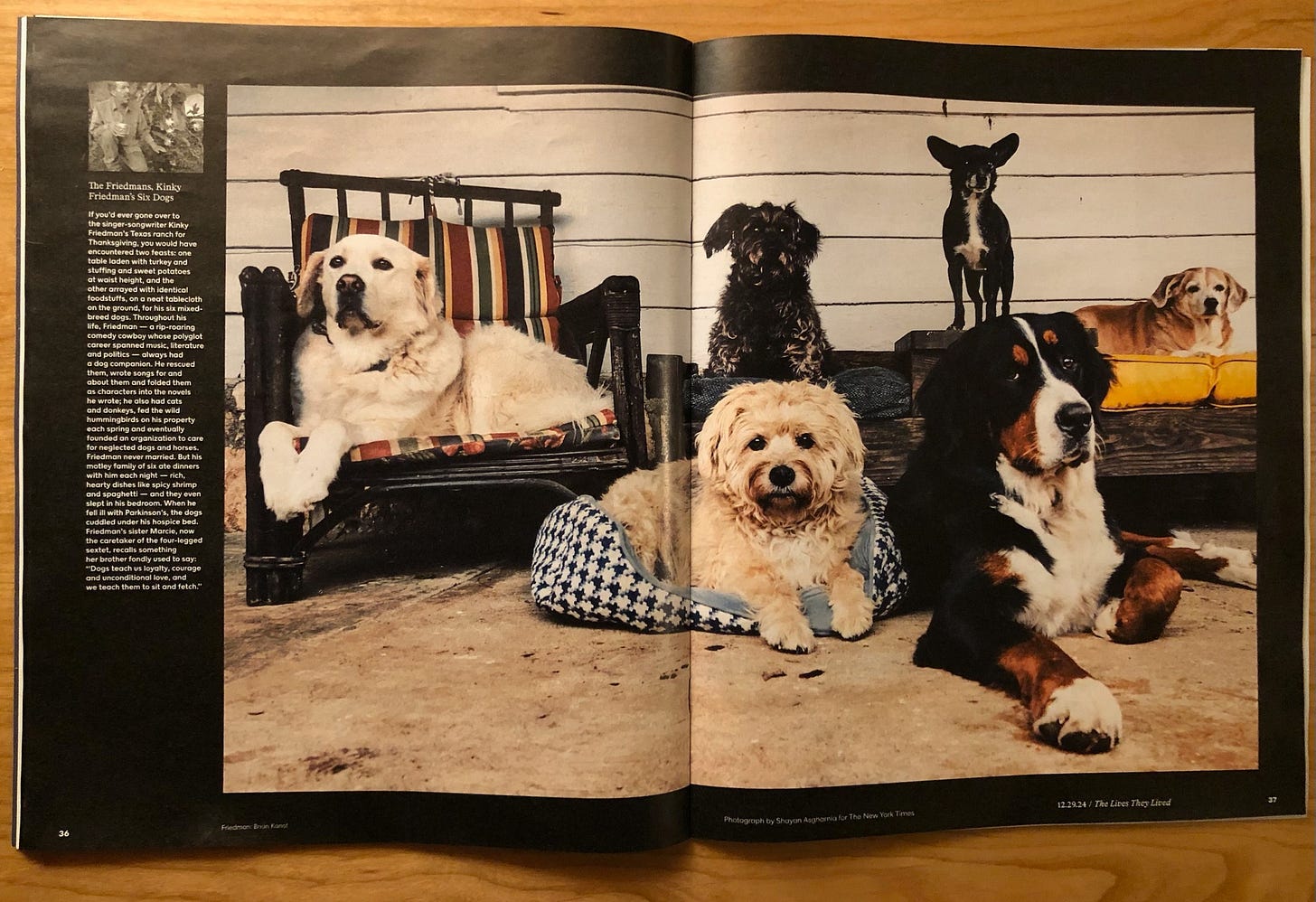Carrying On
Notable departures in 2024
Dear Readers,
I watch the obituaries closer these days than I used to—like the old joke says: to make sure I don’t see my name there. But the end of the year finds many of us looking back on those who made their exit before the turn of the calendar. Officially, the Day of the Dead is November 1 or 2. It seems like it should be December 31, the date that feels like a finish line, a time to say goodbye.
I think we’ve gotta give credit to Jimmy Carter, hanging on into his 100th year to see how the election went and then making his exit before the upcoming inauguration.
I read some of the essays in the New York Times Magazine’s annual “The Lives They Lived” issue. Anthony Giardina on Shelley Duvall, Susan Dominus on Bob Newhart. Wesley Morris on Phil Donahue and Ruth Westheimer, a couple of frank talkers. A number of athletes were memorialized: Willie Mays, Pete Rose, Jerry West. One athlete they omitted was the great Bill Walton. But when he died in May there was a boatload of testimonials. I especially loved the one here by Kareem Abdul-Jabbar. My old pal Al (the nation’s original electronic newsletter writer1) shared a story about the days when he worked at the Nieman Foundation in Cambridge, Mass., and David Halberstam showed up for a seminar with the Nieman Fellows and brought Walton along. (They had become friends when Halberstam was writing The Breaks of the Game.) Walton was playing for the Boston Celtics that year and lived in Cambridge. After the seminar, Halberstam and most of the others drifted off but Walton stayed around with Al and a couple of others, “just drinking beers and talking basketball.” I suspect that was better than the seminar, since Al knows more about sports than anyone I know. “It was a memorable night of wonderful storytelling ... Walton made you feel like you were an old friend,” Al wrote. He recalls that Walton insisted there was never a better center than Wilt Chamberlain and that Wilt would still be the best in the game if he were in the NBA. Not sure how that would sit with Abdul-Jabbar, but Kareem’s line is a pretty good one: “He had wanted to be more like me on the court, I wanted to be more like him off the court.”
There was an obit in November that is worth noting: former Oklahoma Senator Fred Harris died at 94. Harris ran for president as a Democratic populist in 1976—the year that Carter prevailed. Oklahoma is now one of the two or three most right-wing states in the nation, so it may be hard to imagine that someone like Harris—more to the left than Carter ever was—could have been elected, but the country was in flux then. From the Times obit:
As his populism matured ahead of his run for the presidency in 1976, he proposed higher taxes for the rich and lower ones for everyone else, tighter controls over big business, abolition of the Central Intelligence Agency and a “moral” foreign policy that would end American support for dictators.
Earlier in the year, when I paid a visit to the Texas populist Jim Hightower for a Baffler story, I mentioned to him that I’d recently come across my copy of Harris’s campaign manifesto The New Populism. The inside cover included a form to order more copies from the Harris for President Committee, Jim Hightower, Treasurer.
Hightower told me that he had recently taken a trip with his old boss and mentor up to Tulsa, OK. Their agenda was to visit the city’s arts district which includes both the Woody Guthrie Center and the Bob Dylan Center. Hightower shared a few memories of what he learned from Harris in his newsletter here. In Harris’s book, he proposed a slogan for “the new populism”: Arriba con los de abajo. Up with those who are down.
An interesting little echo of the Woody Guthrie connection to such politics. Right below the NYT obit for Harris that day was one for Alice Brock, who died at 83 in Wellfleet, Mass. She was the Western Massachusetts restaurant owner who inspired Arlo Guthrie’s 1967 song “Alice’s Restaurant.” Arlo, of course, is the son of Woody Guthrie and gave voice to a homegrown American anti-war rebellious spirit. He’s now 77, and no longer touring, due to a series of strokes.
Speaking of troubadours, Kris Kristofferson died in September at 88. With Waylon Jennings and Johnny Cash gone, Willie Nelson (age 91) is now the last remaining member of “The Highwaymen.”
And RIP Kinky Friedman, who died in June at 79. From the Texas Tribune obit:
In the early 1970s, Friedman formed the satirical country band Kinky Friedman and The Texas Jewboys — which penned songs like “They Ain’t Makin’ Jews Like Jesus Anymore” and “Get Your Biscuits in the Oven and Your Buns in the Bed.” The latter song, which made fun of feminism, helped Friedman earn the National Organization for Women’s “Male Chauvinist Pig Award.”
At the same time, he gained the respect of musical titans like Bob Dylan, Willie Nelson, Waylon Jennings and Kris Kristofferson.
Friedman also wrote novels and made a longshot run for governor as an independent in 2006, and later for Texas agriculture commissioner. He lost the governor’s race to incumbent Rick Perry, who had replaced George W. Bush, who by that time was in the White House.
There’s something else worth noting about Kinky, though. He took in the dogs of people who died. This is from the CBS News “Notable Deaths of 2024” report:
Not all of his energies were to the humorous, or the Quixotic. In the 1990s he founded an animal rescue, Utopia Animal Rescue Ranch, in Medina, Texas, where he saved more than a thousand dogs and cats from being euthanized, and housed strays awaiting adoption. “I have always felt that what we do when a stray spirit crosses our path—how we react to the hungry, homeless stranger—is indubitably a measure of our own humanity," he wrote in Texas Monthly in 2005. “Mark Twain once said that when you meet Saint Peter, it’s best to leave your dog outside. Heaven, he claimed, runs on protocol. If it ran on merit, your dog would go in and you would stay outside. While I agree with Twain, I see things a little differently. I believe that when you die and go to Heaven, all the dogs and cats you’ve ever had in your life come running to meet you.”
It’s a lovely sentiment, and as good a faith as any other, I think. By the way, the Times Magazine included a feature this year called “Friends to the End”: Portraits of the pets of people who died. Included are “the Friedmans”—Kinky Friedman’s six dogs.
Two end-of-the-year “Best Of” lists to recommend before closing out:
As always, Barry Yeoman puts together an excellent guide to some of the year’s best longform journalism. He’s got a memorable story by Eli Saslow included—about the Republican clerk in Nevada under siege by nutty Trump die-hards. But just about any Saslow feature could be on the list. Just this month he had a powerful account of an immigrant in Rome, Georgia, whose family of Trump supporters somehow don’t think he should be worried about deportation.
Here’s a selected list of the “most sustaining salvos, essays, criticism, and fiction The Baffler published over the last year.” You’ll see some names you recognize.
Happy New Year, everybody! Thanks for being a reader of Dots & Arrows.
More or less. He sent his friends a “Soapboxing” email newsletter in the 1990s, and still writes the occasional “Al Things Considered” missive.





